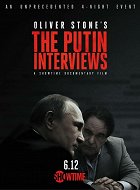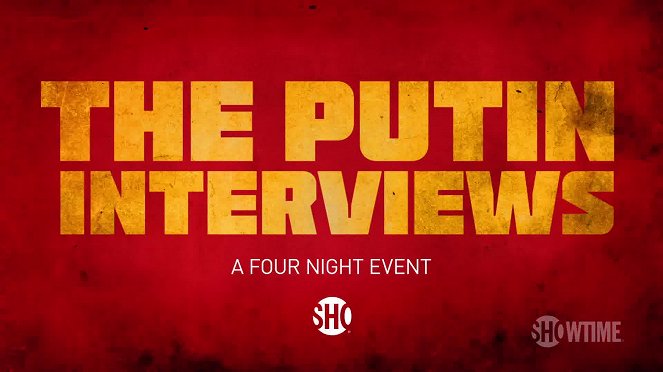Reżyseria:
Oliver StoneScenariusz:
Oliver StoneZdjęcia:
Rodrigo PrietoObsada:
Vladimir Putin, Oliver Stone, Bashar al-Assad (m.a.), Vladimir Zhirinovskiy, Vasily Khristoforov (m.a.), Dan Rather (m.a.), Zbigniew Brzezinski (m.a.)Opisy(1)
Oscar®-winning filmmaker Oliver Stone was granted unprecedented access to Russian president Vladimir Putin during more than a dozen interviews over two years, with no topic off-limits. This remarkable four-part documentary series provides intimate insight into Putin's personal and professional lives, from his childhood under communism, to his rise to power, his relations with four U.S. presidents, and his surprising takes on U.S.-Russian relations today. Witness the most detailed portrait of Putin ever granted to a Western interviewer. (Showtime)
(więcej)Recenzje (2)
The Putin Interviews is pro-Kremlin propaganda mainly for those who have formed an opinion in advance or haven’t seen every episode. I am not asserting that the documentary does not contain factually inaccurate, misleading or false information that would not make one stand up and walk away. It has all of that, and a lot of it, but a critically thinking viewer who does not rely on a single source of information and verifies the facts instead of rejecting them out of hand should be able to recognise and accept them as different points of view (different from that conveyed by most domestic and generally liberal media outlets). I could be wrong, but I think this is the essence of the dialogue. ___ Stone gives Putin the opportunity to present his vision of the world to (mainly) American viewers and, in addition to blatant obsequiousness, asks him rather provocative questions (to which a visibly nervous Putin responds defensively), though he obviously agrees in part with the interviewee more often than he disagrees (but perhaps it is not prohibited to be politically engaged and have an opinion, albeit an unpopular opinion, and stick to it). If Stone had taken a sharply confrontational tone from the start instead of slowly sizing up his subject, the documentary would have lasted not four hours but four minutes and the interview would not have touched on any serious issues (persecution of homosexuals, the conflict in Ukraine, surveillance of Putin’s own citizens, cyberattacks). ___ Unlike the pro-Kremlin trolls, Stone is very knowledgeable of history, though he often cherry picks from it only what fits into his interpretive framework, and he consistently views events in their historical context. I wouldn’t shy away from saying that he was considerably better prepared for the interview than many journalists would have been, thanks to which he is able to pose uncomfortable counter-questions (at one point, for example, he counters a statement by Trump making claims about Russian hackers that are the exact opposite of what Putin, who had praised Trump only moments before, believes). ___ At the same time, Stone, as a visual-oriented filmmaker, does not rely only on the spoken word, but on numerous meanings that sometimes go against what Putin is saying, while also using accompanying images that supplement the context (e.g. the parallels between Stalin’s and Putin’s respective cults of personality during a military parade, to which Stone returns in the final episode in an effort to find Putin’s place among the other great men of Russian history). In this context, I consider the self-reflective beginning of the final episode, in which Stone directs (which is the key word) Putin so that the shot has depth, to be relevant. We are not watching a raw account of reality, but an admitted interpretation of it conceived to, among other things, amplify the dramatic effect (the interviews are thus not arranged chronologically – Stone saves the best for last, even though it comprises words recorded earlier). With its visuals (opening credits, the font used for the names of people) and the choice of events it highlights, The Putin Interviews emphasises Putin’s Cold War perception of international politics, which he himself outwardly rejects. In short, Stone’s post-production interventions not only illustrate what Putin says, but also polemicise against it.___ Although it is not such an audio-visually dense history lesson as The Untold History of the United States, I don’t understand the comments about it being boring, as it is an extraordinarily dynamic affair with layers of meaning, with constant cuts, varying camera angles and settings, animated maps, news footage and film clips that, in the documentary’s best moments, directly become a part of the dialogue in the form of a shared viewing of Dr. Strangelove. If nothing else, Oliver Stone has presented one of history’s best cinematic satires of a cocooned Russian tsar who is convinced of many deeply disturbing “facts” (such as “It’s almost impossible to scare the Russian people”), which is no small feat. 80%
()
(mniej)
(więcej)
A valuable documentary that allows us to look at the American-Russian relationship, and also some of the world's problems from a different side than we are used to. Putin comes across as a lucid, sophisticated, clever politician who has the what and the how exactly straight, while not being afraid to answer some of Stone's well-aimed and pressing questions – the question, of course, is whether or not he answered honestly. Oliver balanced relatively well all on the border of what is still tolerable in the dialogue and what could have been too much. Apparently, he made the most of it.
()

